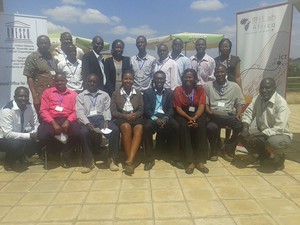Kenya: ICT Training Boosts Community Radios Effectiveness
By Eric Sande
With the evolving technology in place, community radio station across Africa aim to breaking down linguistic barriers between rural communities while improving their communication with decision makers. Their transmitters may reach only a few miles, but technology has enabled isolated communities across Africa to voice their own concerns.
UNESCO under its SIDA funded project themed: “Empowering Community Radios with ICTs” organized a three days ICT and Youth Mobile Training Workshop for 6 community radio stations across the county. It was schedule on 25-27 August 2014 at Ilab, Strathmore University in Nairobi, Kenya.
The stations included Mangelete FM from Machakos County, Mwanedu from Taita Taveta County, Sauti Fm from Kisumu county , Mugambo from Meru County Bus Radio from Kajiado county and Mtaani Radio from Nairobi County. The total Participants were 24 media practitioners.
Mtaani radio and Bus Radio are the new entrant in the UNESCO’s ongoing capacity building initiatives for community radios.
Patrick Modi from Mtaani radio found the chance to add abit more to be techno savvy and no one could remove him from in the lab. He utilized all the short breaks during the training sessions to complete and repeat the exercises and assignments given during the training. It was his chance to have long hours on the internet since their station does not have the internet connection.
“The training was detailed relevant and on point,” lauded Modi.
“ I had the chance to learn how to effectively use the ICTs to perfect my show at Mtaani radio,” he concluded.
The three trainers were meticulous in there delivery as they left a changed society of radio personnel that will translate the knowledge to bring change in their respective communities. Positive feedback from the training was overwhelming and that sums it up with a quote from Joyce Meyer which says'Teachers can change lives with just the right mix of chalk and challenges’.
The training’s objective has been to impart participants with knowledge on technical online platforms that support information delivery as well as communication with and from their radio stations. The participant had the chance to understand the use of internet applications for programming and editorial work as well as broadcasting and delivery. It was an opportunity for the community radio station personnel to establish the extent to which ICTs can be integrated in the daily operations of the radio stations.




